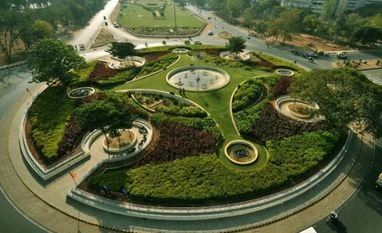Two years after launch of the ambitious Smart Cities project and the Atal Mission for Rejuvenation and Urban Transformation (AMRUT), the National Democratic Alliance government does not have much to showcase yet.
Under the Smart Cities project, of the 2,895 projects worth Rs 1.3 lakh crore, only 181 projects (6.3 per cent) valued at Rs 6,413 crore are under implementation.
Of the 4,672 projects launched under AMRUT, contracts have been awarded for only 1,075 or 23 per cent till date, reveal data accessed by Business Standard. Under AMRUT, the government is supposed to provide water, sewerage, and transport, besides developing open spaces in urban areas. But, almost half of the awarded projects are for developing parks.
Smart Cities
Progress on Smart Cities has been slow.
Of the total investment proposals worth Rs 1.3 lakh crore, projects worth only Rs 6,413 crore are under implementation. Another 186 projects, with investments adding up to Rs 11,760 crore, are under tendering, while detailed project reports are being prepared for the rest.
A government official, however, told this newspaper, “Some cities like Vizag, Bhubaneswar and Kakinada are making good progress because of active involvement of the state governments. Others are picking up.” A smart city must fulfil two criteria. First, it will have to either redevelop at least 50 acres or retrofit 500 acres or build a new project over 250 acres. Second, it will have to provide smart services such as smart metering across the length and breadth of the city.
Data reveal that most cities have accorded less priority to pan-city projects. Of the 329 projects worth Rs 85,505 crore, about 80 per cent are area-based projects and localised. The balance 20 per cent are pan city projects. According to Arindam Guha, Partner at Deloitte Touche Tohmatsu India, if the change has to be quick and tangible, IT solutions are the preferred option as infrastructure development takes time. “Most pan city projects tend to be IT oriented and hence all citizens also tend to benefit.”
Indeed, the numbers suggest that the initial focus has been to create smart enclaves rather than smart cities.
“Focusing on a particular area initially is only to create a demonstration effect which is why most cities have selected the city centre/transit hub for area development. With funding mostly taking place through schemes like AMRUT, Swacch Bharat etc. which adopt a city-wide approach, the upgrade is expected to extend to other parts of the city in a time bound manner,” said Guha. Some have attributed the mission’s lacklustre performance to the dearth of professional expertise and little participation of outside government experts. Other than Chennai, the Special Purpose Vehicles (SPVs) formed in each smart city is headed by a bureaucrat from the Indian Administrative Service. Then there is also the political economy to contend with.
Local councilors and politicians want some sort of representation on board to be able to influence decisions. “Some young IAS officers are performing exceptionally well, but they need stability,” according to a government official.
AMRUT
The stated purpose of AMRUT is threefold – to ensure that every household has access to a tap with assured supply of water and a sewerage connection; to increase the amenity value of cities by developing greenery and well maintained open spaces such as parks; and to reduce pollution by switching to public transport or constructing facilities for non-motorized transport.
Till now, a total of 4,672 projects worth Rs 77,640 crore have been proposed. Of these, work has begun on 1,075 projects costing Rs 17,342 crore. Another 1,507 projects worth Rs 26,213 crore are in various stages of tendering, while detailed project reports for the remaining are being prepared.
In fact, more than 90 per cent of the total proposed investment is geared towards water supply (50.2 per cent) and sewerage and septage management (41.8 per cent). Projects geared towards drainage and urban transport are fewer — 3.8 per cent and 1.9 per cent respectively of the total proposed investment. The balance is to be spent on parks. While this may reflect local priorities, movement on even the water supply and sewerage management projects has been slow.
Of the 1,208 projects for water supply, contracts have been awarded in only 319 or 26.4 per cent of cases. For sewerage and septage management, it is 17.7 per cent, while for drainage it is even lower at 9 per cent. Around 48.4 per cent of the 1,075 contracts that have been awarded are for developing parks. Officials said that not a single project has been completed under AMRUT, but Business Standard couldn’t independently verify it.
Changing track
Indications are that the government is now giving a new peg to the project to show results before the general elections in 2019, a source said. It is identifying projects that will have a ‘big impact’ on the lives of people immediately. “We have identified 241 such impact projects in 60 smart cities all over the country and are hoping to complete them by June next year,” an official said on condition of anonymity. One such project is to construct a ‘smart’ road in Vizag with more space for pedestrians. Another is parks for the disabled.
Unlock 30+ premium stories daily hand-picked by our editors, across devices on browser and app.
Pick your favourite companies, get a daily email with all news updates on them.
Full access to our intuitive epaper - clip, save, share articles from any device; newspaper archives from 2006.
Preferential invites to Business Standard events.
Curated newsletters on markets, personal finance, policy & politics, start-ups, technology, and more.



)